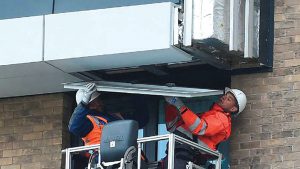Bloomberg
UK property developers must contribute to a 4 billion-pound-fund ($5.4 billion) to fix dangerous cladding on low-rise apartment blocks by March or face new regulations that would force them to pay, Housing Secretary Michael Gove said.
Gove said it was “morally wrong†that homeowners were still trapped in unsafe and unsellable apartments more than four years after the fire at Grenfell Tower in London, in which flammable cladding materials contributed to the deaths of 72 people.
“To those who missold dangerous products like cladding or insulation, to those who cut corners to save cash as they developed or refurbished people’s homes, and to those who sought to profiteer from the consequences of the Grenfell tragedy: we are coming for you,†Gove said in a House of Commons statement.
Gove is trying to draw a line under a scandal around buildings standards that was exposed by the Grenfell tragedy in June 2017. An estimated three million people live in apartment blocks with dangerous materials, and many face
eye-watering bills for repairs.
The government had already committed as much as 5 billion pounds to fix the tallest buildings, but it is now demanding that homebuilders contribute to the costs of remediation work on buildings between 11 meters and 18 meters tall. Gove said developers must meet the costs of other fire safety issues, including missing fire breaks and defective
compartmentation.
Previously, leaseholders in buildings of between four and six storeys had only been promised access to loans to help cover the costs themselves.
If developers do not comply, the government could restrict their access to UK funding and future procurements. Using planning powers and pursuing firms through the courts are also options.
All firms with annual profits from housebuilding of at least 10 million pounds are expected to contribute.
Gove said he had withdrawn “misinterpreted†government advice that had prompted too many buildings to be declared unsafe, and that before Easter the government would indemnify building assessors conducting external wall assessments to “give them the confidence to exercise their balanced professional judgment.â€
Those assessments will be audited to make sure expensive mediation is only being advised where it is necessary to remove a threat to life, he said.
Gove has written to housebuilders to convene a meeting over the next few weeks. If no solution is agreed around the table, clauses in the Building Safety Bill — currently going through Parliament — allow the government to introduce a levy on developers of high-rise buildings, on top of the 4% tax on the largest most profitable developers announced in last year’s Budget.
Stewart Baseley, executive chairman of the Home Builders Federation, which represents private sector developers in England and Wales said in a statement: “We will engage directly with government but any further solutions must be proportionate, and involve those who actually built affected buildings and specified, certificated and provided the defective materials on them.â€
A spokesperson for the End Our Cladding Scandal campaign group said: “The burden of paying for repairs for other serious safety defects –- lack of compartmentation, missing fire breaks, shoddy building work -– has still not been lifted from leaseholder shoulders, whatever their building’s height.â€
 The Gulf Time Newspaper One of the finest business newspapers in the UAE brought to you by our professional writers and editors.
The Gulf Time Newspaper One of the finest business newspapers in the UAE brought to you by our professional writers and editors.
